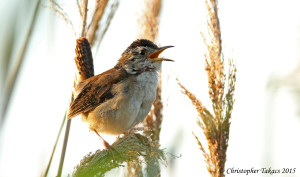Whether you are wandering the trails of DeKorte Park, or meandering Mill Creek Point you are almost sure to hear bubbling burbles and chatters coming from meadow grasses. This seldom seen but more often heard little bird is the Marsh Wren. A delightful, tiny bird about 5 inches in length that makes up for its small stature with its loud singing voice. The Marsh Wren can be heard filling the meadows air with its gurgling melody in both day and even sometimes at night during breeding season. For me it is a joy to hear its unique happy sounds as I stroll the Marsh Discovery Trail at DeKorte Park. At the same time it is also very challenging to get a glimpse of the little wren unless you are very patient as it quickly maneuvers thorough the phragmities searching for insects. Occasionally if you are very lucky one will pop to the top of the grasses and give you a quick peak before it disappears once again.
It seems to me that the Marsh Wren was not always as common as it is today in the Meadowlands. I can’t recall seeing or hearing this charming little bird in my more youthful years. Just as the Eagle and the osprey have returned maybe it was also the case for the little Marsh Wren? So, since birders’ memories can be a bit subjective (especially mine) I thought I would ask Rick Wright , author of “Field Guide to Birds of New Jersey.”
“Marsh wrens are exceptionally sensitive to habitat changes” Rick told me , “and when marshes degrade or are destroyed, the marsh wrens go with them. They’ve increased in the Meadowlands with the increase in marsh quality — but may decline again if, for example, certain new non-native invasive plants such as Arundo colonize.” Rick also said they are susceptible to pollutants. “Marsh Wrens are also known to carry high levels of heavy metals in southwest Arizona, but I don’t know whether that’s the case here,” he said.

